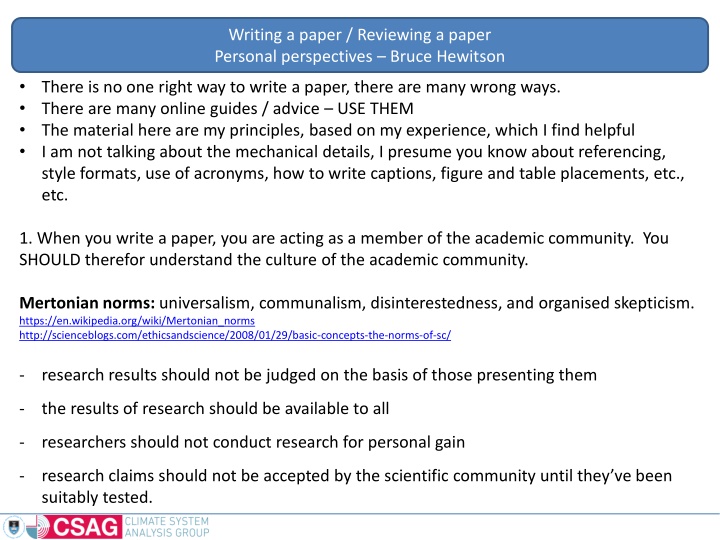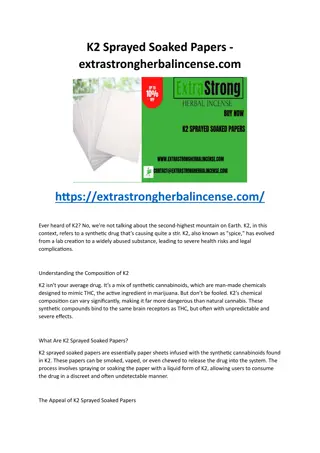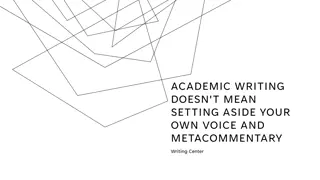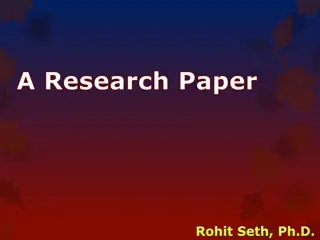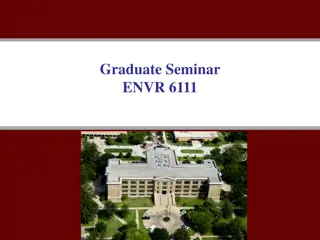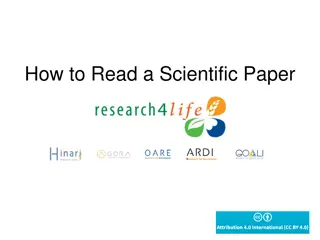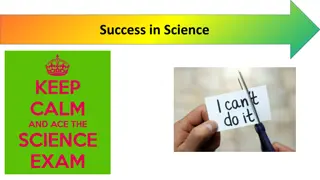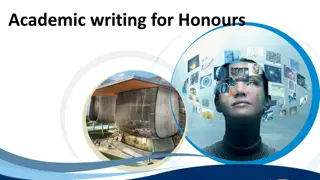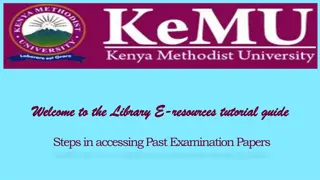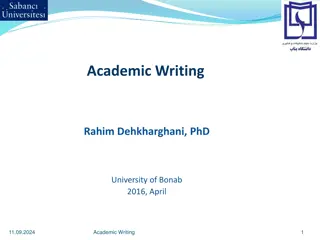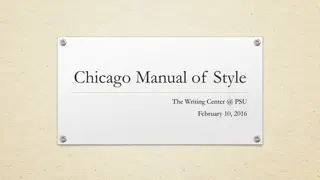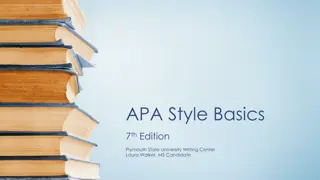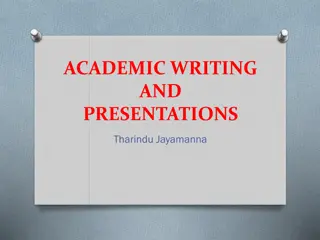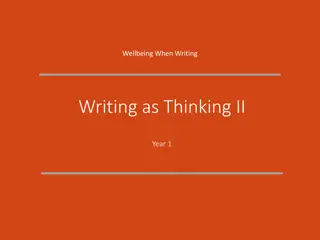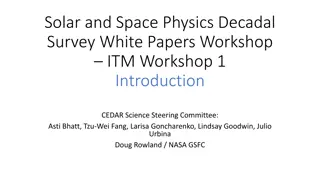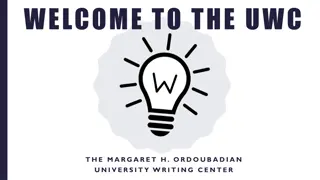Effective Strategies for Writing Academic Papers
Understanding the academic community's norms, outlining the paper's objective, structuring the content effectively, and telling a compelling story are key aspects highlighted in the material. Emphasizing the importance of addressing a valuable question and adding to existing literature, the guide provides insights on structuring the paper logically and crafting a cohesive narrative.
Download Presentation

Please find below an Image/Link to download the presentation.
The content on the website is provided AS IS for your information and personal use only. It may not be sold, licensed, or shared on other websites without obtaining consent from the author.If you encounter any issues during the download, it is possible that the publisher has removed the file from their server.
You are allowed to download the files provided on this website for personal or commercial use, subject to the condition that they are used lawfully. All files are the property of their respective owners.
The content on the website is provided AS IS for your information and personal use only. It may not be sold, licensed, or shared on other websites without obtaining consent from the author.
E N D
Presentation Transcript
Writing a paper / Reviewing a paper Personal perspectives Bruce Hewitson There is no one right way to write a paper, there are many wrong ways. There are many online guides / advice USE THEM The material here are my principles, based on my experience, which I find helpful I am not talking about the mechanical details, I presume you know about referencing, style formats, use of acronyms, how to write captions, figure and table placements, etc., etc. 1. When you write a paper, you are acting as a member of the academic community. You SHOULD therefor understand the culture of the academic community. Mertonian norms: universalism, communalism, disinterestedness, and organised skepticism. https://en.wikipedia.org/wiki/Mertonian_norms http://scienceblogs.com/ethicsandscience/2008/01/29/basic-concepts-the-norms-of-sc/ - research results should not be judged on the basis of those presenting them - the results of research should be available to all - researchers should not conduct research for personal gain - research claims should not be accepted by the scientific community until they ve been suitably tested.
Title My wonderful thesis / paper / report What Goal/Objective Bookends thinking Why is it important? One way to think about setting up the scope and structuring the foci of a document Why What have others done? My approach Working from the meta-message level down to the details Methods and tools How Application issues Before writing, you should be able to put a sentence to each of these. The analysis Things may change that s ok, but it will create a skeleton to keep things on track. The journey What were my results? Relevance of outcomes? At the end, a person should be able to read a paper by reading the first line of each paragraph Conclusion The outcome Take away message
Writing a paper Establish the type of paper: methodological, key results, exploratory, review, etc., and stick to it. The question is critical. What is the question your paper is addressing. Can you state it in one sentence? Why even write this paper? Understand if you have something of value to report. Ask, what am I adding to the literature (if anything)? Be hard on yourself with the so what question. If you were never to write the paper, what difference would that make? Find your literature launchpad the lit review . This is not like a thesis lit review, but a review of the foundations on which YOUR work is predicated, and which give legitimacy to the steps you have taken. Design your STRUCTURE what are the essentials that have to be in the paper steps that are necessary to link the logic that underpins the conclusion. Decide your STORY sit down with a beer (figuratively), close your eyes, and tell yourself the story from beginning to end. If you can t, then figure out what's missing, fix, and start telling the story again.
Writing a paper Approaches to writing: - Write to a skeleton: set out the elements and write to fill these. For example, this is how an IPCC chapter is written. - Establish the core evidence figure, results, and write backwards / forwards from there including undertaking additional research as the discussion begins to demand additional evidence. This is how I wrote the SOM methodology paper. - Recognize a challenge that warrants attention. Articulate what that challenge really entails, write it out without the research. Then go an do the research and adapt to what the results show (not what you want them to show). This is how I wrote the Climate services paper. - Begin with an idea and see where it goes works ok in developing a perspective piece, but not advised for basic research results. This is how I wrote the capacity development paper and information ethics papers.
Writing a paper Writing considerations: Only cover one main theme if you have more, write other papers Say upfront what you will say, and what you will not say Hooks, especially opening statements, are critical to capturing the reader / reviewer No extraneous details - every sentence / figure / table is only included to support the story Simple is strong, but too simple means you open yourself to challenge - anticipate how someone with a vested interest might challenge you Anticipate how what questions will be raised in peoples minds; either provide them, or proactively state that you re not going to answer them Iterate multiple times, take time between iterations you can get too close to the text. Get the text as succinct as possible without losing necessary information. Readers get easily bored, don t bore your reader Share a draft, and be humble about the comments don t get defensive. BEWARE hyperbole and inflation! Don t tell people what they already know (which presumes you know the knowledge space of your audience) Be willing to speculate, trigger unusual thoughts for the reader. I once had a paragraph on love in a science paper! Max-Neef in his book Human Scale Development , provocatively argues that one can read and study everything that is written on the phenomenon of love, but one can never truly understand love without falling in love.
Reviewing a paper http://www.sciencemag.org/careers/2016/09/how-review-paper You are not out to show how clever you are You are not criticizing, you are helping improve the paper by being a filter You have a responsibility to TRUTH, to the science, not to the author Give credit where due If they have done something you think you would like to have done yourself, don t let that bias an honest review Check assumptions. Check assumptions. Check assumptions. Check logic. Check logic. Check logic. Your own logic and the authors. Don t be overly pedantic on grammar. Don t try impose your style. Work with the author, not against the author. Give due diligence to aid the editor in his decision.
